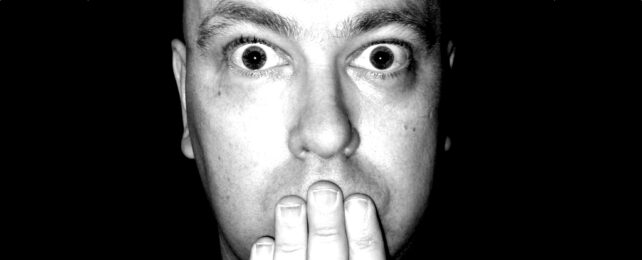For most of us, hiccups are rather annoying but thankfully short-lived. In severe cases, they can persist for a few days, which sounds like a LOT.
But next time you're struggling through a symphony of involuntary gasps, spare a thought for a man named Charles Osborne, who suffered the social inconvenience for a stunning 68 years.
On 13 June 1922, when a young Osborne was working on a farm in Nebraska, he started hiccupping during an encounter with a hog, and he didn't stop till 1990.
More on that shortly. But why do we get hiccups, and does anything stop them?
Hiccups are thought to start with a neural pathway called a reflex arc. The physical experience involves involuntary contraction of respiratory muscles, and the opening between the vocal cords – the glottis – abruptly closes, which makes the recognizable 'hic' sound.
Things that trigger the contractions can cause hiccups, like drinking too much alcohol, eating too much or taking in air while chewing, some medications, or even excitement and laughing.
Hiccups can happen alone or in clusters of a fairly regular rhythm, producing four to 60 per minute. There's not a lot known on why they occur, but we even get hiccups in the womb, suggesting this might prepare our muscles for breathing.
The medical name for the phenomenon is singultus, from the latin term singult, which roughly means to catch breath while sobbing, and that probably feels very appropriate and relevant when you're in the midst of a bout of singultus.
Some common remedies are drinking or gargling cold water, breathing into a paper bag, holding your breath, and even hypnosis or acupuncture. There's no evidence that any of these are effective, or safe. Getting someone to scare or tickle you may distract you but probably won't stop hiccups.
Quite possibly the only remedy that's shown promise is a special straw (appropriately called HiccAway) developed by a neurologist in recent years. In early evaluations, 90 percent of people found HiccAway more effective than any home remedy, but further and more robust study is needed.
Plain old regular cases of the hiccups typically resolve without intervention, just patience, but longer-lasting hiccups should be taken more seriously.
Chronic hiccups – the term for persistent (more than 48 hours) or intractable (more than a month) bouts – can not only be distressing and cause exhaustion and weight loss, they could indicate a serious underlying cause.
That could be central nervous system disorders, diabetes, surgery, reflux, stroke, or cancer, to name a few.
It's important to see a doctor for chronic hiccups, as proper investigations might reveal more about the cause. A small study found 80 percent of chronic hiccup patients had esophageal or stomach abnormalities, and two-thirds of those cases were treatable.
A review of proposed pharmaceutical treatments for chronic hiccups found not enough evidence to support one over the other, suggesting it comes down to the individual case. Determining and treating the root medical cause appears most useful.
In one rare case, three weeks of hiccups were the only symptom that led a patient to present to emergency. It turned out he was experiencing a heart attack, as was another patient with four days of hiccups.
A musician in England once had hiccups for about three years; finally doctors determined that they were being caused by a brain tumor, and surgery fixed the case.
Poor Osborne, however, was not so lucky.
Despite visits to multiple doctors, no cure for his hiccups was found. It's reported that one doctor tried to stop them with carbon monoxide and oxygen, but Osborne couldn't breathe safely. He reportedly lived his life with good humor, and learned a breathing technique to minimize the 'hic' sound.
In February 1990, Osborne's hiccups abruptly stopped for an unknown reason. He died in May 1991, following what must have been a wonderfully hiccup-free year and a bit.
He'd experienced an estimated 430 million hiccups in his lifetime.
